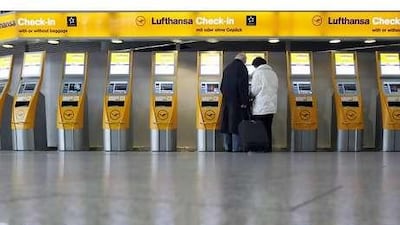When Malaysia Airlines wanted to build sales kiosks to provide a way for customers to avoid queuing at the sales counter, it turned to the iPad. Apple's tablet computer is not even being sold in Malaysia yet, but that did not prevent the airline from buying five iPads abroad and attaching them to stands. In the span of four weeks, and at a cost of about €1,000 (Dh4,501) per unit, it had built fully functional kiosks that allow customers to select itineraries, pay via credit card and receive confirmation via SMS and e-mail.
The result is a paperless booking process that has saved the carrier time and money. Information technology (IT) "is changing the way the world works - again", says Paul Coby, the chairman of SITA, an IT firm for the aviation industry, and the chief information officer of British Airways. Mr Coby, a silver-haired man who has an iPad and uses Twitter, is pushing to change the way airlines operate and interact with clients. He was a host at SITA's annual conference in Brussels last week. "There is no waiting in queues in cyberspace, or at least there shouldn't be," he says.
Airlines globally have lost US$50 billion (Dh183.65bn) in the past decade, and passenger frustrationhas climbed as the air transport experience has become synonymous with long queues and lost baggage. But in the multibillion-dollar aviation IT industry, firms such as SITA are working with airlines and airports to streamline the entire passenger experience. SITA helped Malaysia build its iPad sales kiosks and is the main provider of the self-service check-in facilities popular at airports worldwide. The kiosks can print boarding passes and baggage tags, and they have helped airlines halve the average transaction time compared with counter check-ins and cut their floor-space requirements by 50 per cent.
Mr Coby says BA has steadily increased its offerings for customers via online and mobile channels since 2002. The airline's iPhone application has been downloaded 500,000 times. In the next digital decade, he says, "every traveller is going to have a digital identity. There will be 5 billion people on the internet by 2020, and all our customers will be there. So we've got to be there, and we've got to be there in ways they want us to be there."
Technology's spread throughout the entire customer experience - from booking a flight to checking in to passing through security and locating baggage - has been just as sure and steady as the oft-quoted maxim of Moore's law, which states that the number of transistors on a chip doubles every 24 months. The principle was framed by the co-founder of Intel in 1965, around the time that American Airlines and the rival Delta Air Lines created two of the first automated reservations systems.
These computer systems revolutionised air transport, says Henry Harteveldt, a vice president and principal analyst at Forrester Research in San Francisco. Airlines eventually ended the exclusivity of their reservations systems and included travel agents in the loop. In the 1990s and early 2000s, this was extended to web-based booking sites. For the next IT step forward, airline executives such as Tony Tyler, the chief executive of Cathay Pacific Airways, say Apple, Google and other technology companies have revolutionised the way people use digital devices and can light the way forward.
"I think the bar has been set very high by Apple, and our customers can't understand why we can't match it," he says. "People's experience with IT mainly is playing around with applications. And smartphones and iPads, those things work. They work smoothly, they work intuitively. That is what people expect from our processes, from our IT systems." As it did with its iPad kiosk, Malaysia Airlines has used the growing popularity of smartphones such as the iPhone to produce a service using "augmented reality".
The application uses the GPS and motion sensors built into the iPhone to zero in on where the phone's camera is pointing, such as a location in an airport. The phone's screen shows airfares that are available from Malaysia Airlines. Passengers can book their flights via the same phone. SITA officials say that as more devices are connected, augmented reality applications could be extended to help passengers navigate a range of challenges such as finding the nearest toilet, their baggage and their metro platform.
While airlines in the Middle East and North Africa are spending an estimated $3bn this year on IT items such as web-based services and contact centres, the real investment is taking place to create "digital airports", according to SITA. The region's airports will spend $40bn this year, and Abu Dhabi officials say they are designing a new passenger terminal that will offer a comprehensive network of Wi-Fi and other enhanced services.
"We are designing cabling infrastructure like many would design water lines," says Michael Ibbitson, the vice president of information and communication services at Abu Dhabi Airports Company (ADAC), of the Midfield Terminal project planned to open in 2015. "This will allow us to quickly deploy IT services throughout the airport's lifespan." The airport recently saw its Wi-Fi user numbers surge from 50 a month when there was a charge for the service to 150,000 when the airport made the service free.
In Dubai, Paul Griffiths, the chief executive of Dubai Airports, says the airport industry should embrace technology to improve baggage handling and speed passengers through check-in, customs and immigration - and free up time they might use for shopping. "Right now, there are only two places people queue - at the airport and at the post office. And frankly, I'd be glad to let the post office have that distinction for itself."
@Email:igale@thenational.ae

